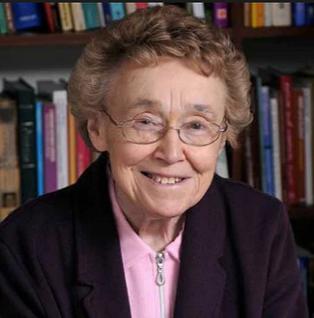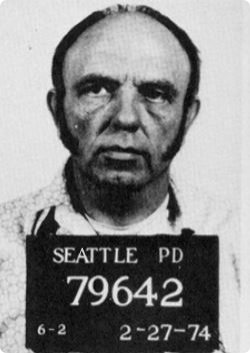Related Research Articles
Sara Jane Olson is an American far-left activist who was a member of the Symbionese Liberation Army (SLA) in 1975. The group disbanded and she was a fugitive for decades before being arrested. In 2001, she pleaded guilty to attempted murder related to a failed bombing plot. In 2003 she pleaded guilty to second-degree murder related to the death of a customer during a botched bank robbery the SLA committed in California. Known then as Soliah, she was also accused of helping a group hide Patty Hearst, a kidnapped newspaper heiress, in 1974. After being federally indicted in 1976, Soliah was a wanted fugitive for several decades. She lived for periods in Zimbabwe and the U.S. states of Washington and Minnesota.

Asperger syndrome (AS), also known as Asperger's syndrome or Asperger's, is a diagnostic label that has been used to describe a neurodevelopmental disorder characterized by significant difficulties in social interaction and nonverbal communication, along with restricted, repetitive patterns of behavior and interests. Asperger syndrome has been merged with other conditions into autism spectrum disorder (ASD) and is no longer a diagnosis in the WHO's ICD-11 or the APA's DSM-5-TR. It was considered milder than other diagnoses which were merged into ASD due to relatively unimpaired spoken language and intelligence.

Lorna Gladys Wing was a British psychiatrist notable for her research into autism. She coined the term Asperger's syndrome and helped found the National Autistic Society.
Pervasive developmental disorder not otherwise specified (PDD-NOS) is a historic psychiatric diagnosis first defined in 1980 that has since been incorporated into autism spectrum disorder in the DSM-5 (2013).
Barry Michael George is an English man who was found guilty of the murder of English television presenter Jill Dando and whose conviction was overturned on appeal.
High-functioning autism (HFA) was historically an autism classification to describe a person who exhibited no intellectual disability but otherwise showed autistic traits, such as difficulty in social interaction and communication. The term was often applied to verbal autistic people of at least average intelligence. However, many in medical and autistic communities have called to stop using the term, finding it simplistic and unindicative of the difficulties some autistic people face.

Robert Lee Yates Jr., also known as the Grocery Bag Killer, is an American serial killer from Spokane, Washington. From 1975 to 1998, he is known to have murdered at least 11 women in Spokane. He also confessed to two murders committed in Walla Walla in 1975 and a 1988 murder committed in Skagit County.

Roderick Justin "Rod" Ferrell is an American murderer and cult leader. He was a member of a loose-knit gang of teenagers from Murray, Kentucky, known as the "Vampire Clan". Ferrell claimed to be a 500-year-old vampire named Vesago, a character he created for himself after becoming obsessed with the role playing game Vampire: The Masquerade. It was his mother, Sondra Gibson, who first introduced this game to Rod. In 1998, Ferrell pleaded guilty to the double slaying of a couple from Eustis, Florida, becoming the youngest person in Florida on Death Row at that time. Originally sentenced to death, Ferrell's penalty has since been reduced to life imprisonment. In 2023, he married Stephanie Ferrell.

Wrong Planet is an online community for "individuals with Autism, Asperger syndrome, ADHD, PDDs, and other neurological differences". The site was started in 2004 by Dan Grover and Alex Plank and includes a chatroom, a forum, and articles describing how to deal with daily issues. Wrong Planet has been referenced by the mainstream U.S. media. Wrong Planet comes up in the special education curriculum of many universities in the United States. A page is dedicated to Wrong Planet and its founder in Exceptional Learners: Introduction to Special Education.
Clinical vampirism, more commonly known as Renfield's syndrome, is an obsession with drinking blood. The earliest presentation of clinical vampirism in psychiatric literature was a psychoanalytic interpretation of two cases, contributed by Richard L. Vanden Bergh and John. F. Kelley. As the authors point out, brief and sporadic reports of blood-drinking behaviors associated with sexual pleasure have appeared in the psychiatric literature at least since 1892 with the work of Austrian forensic psychiatrist Richard von Krafft-Ebing. Many medical publications concerning clinical vampirism can be found in the literature of forensic psychiatry, with the behavior being reported as an aspect of extraordinary violent crimes.

Societal and cultural aspects of autism or sociology of autism come into play with recognition of autism, approaches to its support services and therapies, and how autism affects the definition of personhood. The autistic community is divided primarily into two camps: the autism rights movement and the pathology paradigm. The pathology paradigm advocates for supporting research into therapies, treatments, and/or a cure to help minimize or remove autistic traits, seeing treatment as vital to help individuals with autism, while the neurodiversity movement believes autism should be seen as a different way of being and advocates against a cure and interventions that focus on normalization, seeing it as trying to exterminate autistic people and their individuality. Both are controversial in autism communities and advocacy which has led to significant infighting between these two camps. While the dominant paradigm is the pathology paradigm and is followed largely by autism research and scientific communities, the neurodiversity movement is highly popular among most autistic people, within autism advocacy, autism rights organizations, and related neurodiversity approaches have been rapidly growing and applied in the autism research field in the last few years.

Johann Friedrich Karl Asperger was an Austrian physician. Noted for his early studies on atypical neurology, specifically in children, he is the namesake of the former autism spectrum disorder Asperger syndrome. He wrote more than 300 publications on psychological disorders that posthumously acquired international renown in the 1980s. His diagnosis of autism, which he termed "autistic psychopathy", garnered controversy. Further controversy arose in the late 2010s over allegations that Asperger referred children to the Am Spiegelgrund children's clinic in Vienna during the Nazi period. The clinic was responsible for murdering hundreds of disabled children deemed to be "unworthy of life" as part of the Third Reich's child euthanasia programs, although the extent of Asperger's knowledge of this fact and his intentions in referring patients to the clinic remain yet to be ascertained.
Internet homicide, also called internet assassination, refers to killing in which victim and perpetrator met online, in some cases having known each other previously only through the Internet. Also Internet killer is an appellation found in media reports for a person who broadcasts the crime of murder online or who murders a victim met through the Internet. Depending on the venue used, other terms used in the media are Internet chat room killer, Craigslist killer, Facebook serial killer. Internet homicide can also be part of an Internet suicide pact or consensual homicide. Some commentators believe that reports on these homicides have overemphasized their connection to the Internet.
Philip Markoff was an American medical student who was charged with the armed robbery and murder of Julissa Brisman in a Boston hotel on April 14, 2009, and two other armed robberies. Markoff maintained his innocence of all charges and pleaded not guilty at his arraignment. A grand jury indicted Markoff for first-degree murder, armed robbery, and other charges.

Harvey Louis Carignan was an American serial killer who was sentenced to life in prison for the murders of two women in the early 1970s. He had been previously convicted of a 1949 rape and murder he committed while stationed in the U.S. Army, in Anchorage, Alaska. He was imprisoned at the Minnesota Correctional Facility – Oak Park Heights, Stillwater, MN until his death in 2023.
The Malmö shootings were a string of attacks by Peter Mangs, a serial shooter lone wolf terrorist, also known as the Laser Man II, in the southern Swedish city of Malmö between December 2009 and October 2010. The shooter apparently targeted people with dark skin. As of 23 October 2010, as many as 15 shootings were linked to the same suspect.

Michael Fitzgerald is an Irish professor of child and adolescent psychiatry, specialising in autism spectrum disorder (ASD).
Troy LaFerrara was a Port Trevorton, Pennsylvania man murdered on November 11, 2013. Miranda Barbour and her husband, Elytte Barbour, were found guilty and sentenced to life in prison in September 2014. The murder is notable because of the unsubstantiated claim by one of the killers, Miranda Barbour, that she had murdered at least 22 other people, triggering worldwide news coverage of the case.
References
- 1 2 "Craigslist Killer Michael John Anderson". New York Daily News . April 2, 2009. Archived from the original on April 6, 2009. Retrieved April 21, 2009.
April 2, 2009: New York Daily News refers to Michael John Anderson as "Craigslist Killer."
- ↑ Havens, Chris; and James Walsh. "Saturday: Online nanny ad ends in slaying" Archived 2009-08-01 at the Wayback Machine , Star Tribune , 28 October 2007. Retrieved 18 September 2009.
- 1 2 "Police know how, can't explain why". StarTribune . October 31, 2007. Archived from the original on April 4, 2009. Retrieved April 21, 2009.
- 1 2 3 "'Craigslist killer' Michael John Anderson gets life in murder of Katherine Olson". New York Daily News / Associated Press. April 3, 2009. Archived from the original on April 6, 2009. Retrieved April 21, 2009.
- ↑ Simons, Abby (March 13, 2009). "Asperger's diagnosis is rejected in Craigslist trial". Star Tribune. Retrieved August 5, 2017.
- ↑ "FindLaw's Supreme Court of Minnesota case and opinions".
- ↑ "Details".